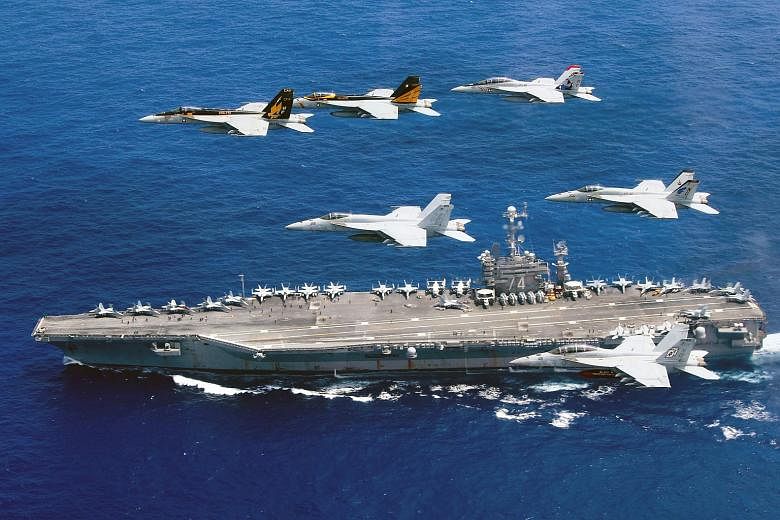Suthichai Yoon
The Nation/ Asia News Network
The Permanent Court of Arbitration (PCA) in The Hague - the world's oldest international tribunal for international resolutions of disputes between nations - has said it will issue a verdict on July 12 on the South China Sea case unilaterally initiated by the Philippines.
"The Tribunal will issue its Award on Tuesday, 12 July 2016, at approximately 11am," the PCA, acting as the registry of the tribunal, said in a press release.
"The Award will first be issued via email to the parties, along with an accompanying press release containing a summary of the award," it said.
The case was taken to the court by the Aquino administration in the Philippines.
How the new president, Rodrigo Duterte, will react to the outcome remains a moot point.
He has sent out mixed signals on how he will treat the issue.
His attitude will determine how Asean decides to react - and in a way, that will also offer some clear indications on how China's relations with Asean on this particular conflict will fare from now on.
China has refused to participate in the proceedings and declared that it will never recognise the verdict, insisting that the tribunal has no jurisdiction to rule on the case because it is in essence related to territorial sovereignty and maritime delimitation.
Beijing has said that territorial issues are not subject to the UN Convention on the Law of the Sea (UNCLOS), and that as early as in 2006 it declared - in line with UNCLOS - to exclude disputes concerning maritime delimitation from mandatory dispute-settlement procedures.
No sooner had the PCA set the date for the issuance of the final award than Chinese Foreign Ministry spokesman Hong Lei went on record as saying that the arbitral tribunal has no jurisdiction over the case and the relevant subject-matter, and that it should not have heard the case or rendered the award.
Beijing's stand has all along been that the Philippines' "unilateral initiation of arbitration" breaches international law.
"With regard to territorial issues and maritime delimitation disputes, China does not accept any means of third-party dispute settlement or any solution imposed on China," he stressed.
Beijing has charged that the government of former Philippine President Benigno Aquino III filed the arbitration against China in 2013, despite the agreement his country had reached with China on resolving their South China Sea disputes through bilateral negotiations.
Manila asserted that its submissions did not concern territorial sovereignty or maritime delimitation.
The Philippine Foreign Ministry, a day after launching the arbitration, described the purpose of the case as to "protect our country's territory and oceanic area" and vowed not to "give up our country's sovereignty".
China has apparently stepped up pressure on Asean in the months leading up to the expected verdict.
The embarrassing failure to issue the joint Asean foreign ministers' statement after a "media statement" was "leaked" by the Malaysian delegation underscored the failure of the 10 members to clobber up a consensus to express their "serious concern" over the rising tension in the South China Sea.
The draft was recalled "for urgent amendments" but no joint statement saw the light of the day after that.
The upcoming 49th Asean foreign ministers' meeting in Vientiane, the current chair, starting July 21 will prove crucial for the regional grouping's dynamics - to show that its collective voice on a critical issue can make a difference.
Will the 2012 Phnom Penh incident repeat itself?
That's when Cambodia, the host, scuttled the issuance of an Asean joint statement that included a clear mention of the South China Sea conflict.
The Philippines protested, to no avail. Cambodian Premier Hun Sen, with close ties to Beijing, held on to his government's stand to foreclose the release of the statements on grounds that it may do more harm than good to the grouping.
That was the first "non-issuance of a joint statement" following a summit in Asean's history.
Some analysts have classified the 10 Asean members into two groups: Four territorial claimants in the South China Sea - the Philippines, Malaysia, Vietnam and Brunei - while two others - Indonesia and Singapore - have recently increasingly become "interested parties" in the disputes.
That leaves Thailand and Myanmar in the "observer" status.
But can Thailand really be a "bystander" when it has become increasingly clear that without some real efforts by all member countries to work out a common position on the issue to push back against undue pressure from major countries, the future of Asean as a viable, dynamic and united entity may be thrown into doubt?
China may have insisted that it will engage in bilateral talks with countries involved in the conflict, but reality dictates that only if Asean's collective voice is heard to work towards practical solutions can real stability and peace be achieved in the region.
Singapore Defence Minister Ng Eng Hen said last week that there is a firm basis for Asean helping to resolve disputes involving several of its member states and China in the South China Sea.
He was quoted as saying: "The Chinese would prefer individual nations, claimant states, to settle their claims bilaterally … but for Asean and other countries there is no ignoring that fact that the South China Sea is an international waterway."
He noted that Asean and China in 2002 signed the Declaration on the Conduct of Parties (DoC) in the South China Sea.
That document, which details how to approach problems in the South China Sea, demonstrates that Asean is "already involved," he said.
With the imminent tribunal ruling, the waters in the South China Sea are bound to get choppy.
Tensions will rise.
Actions and reactions will escalate.
Asean can either ride the crest or be swept under the strong tidal waves.
-----------------------------

